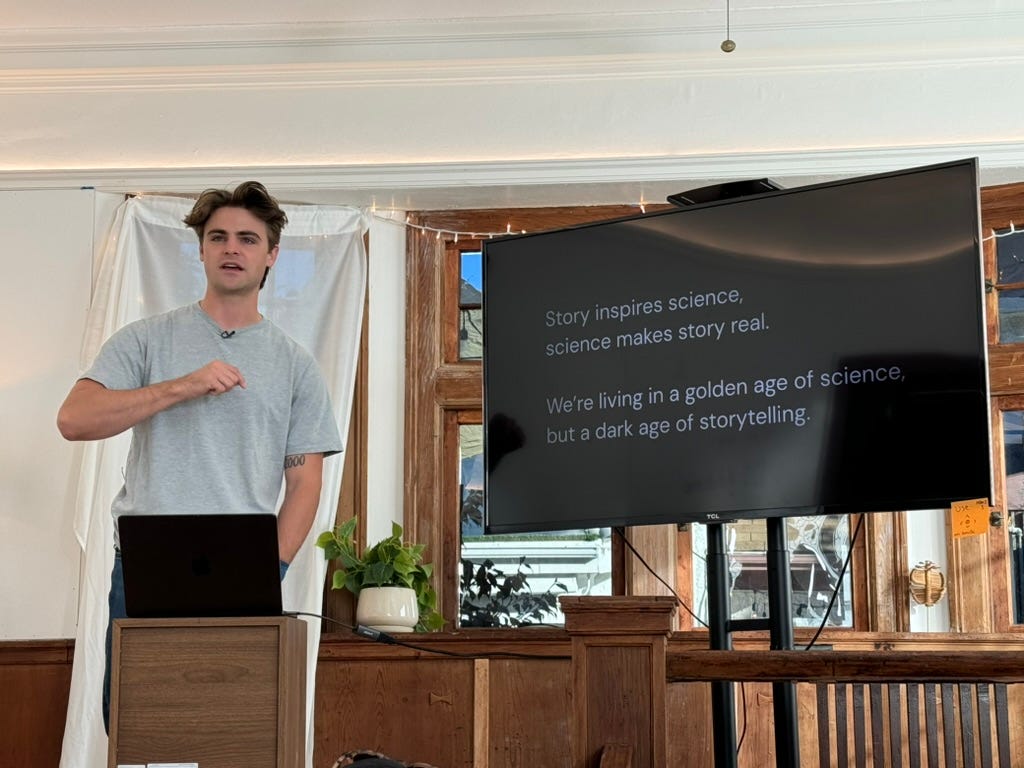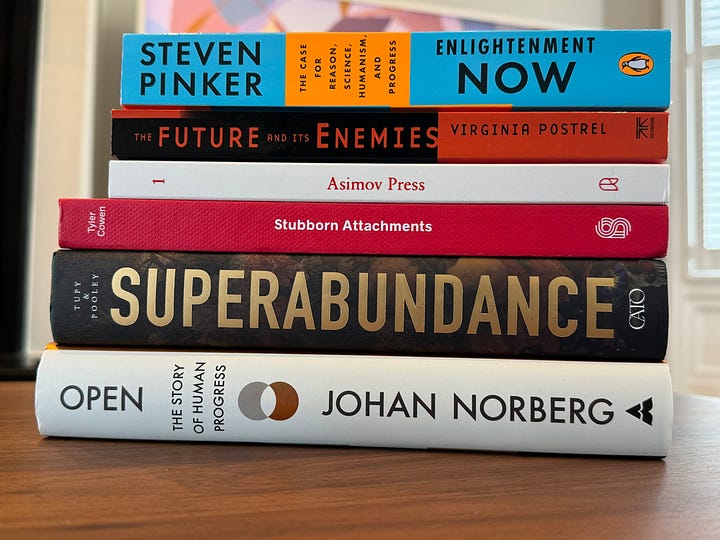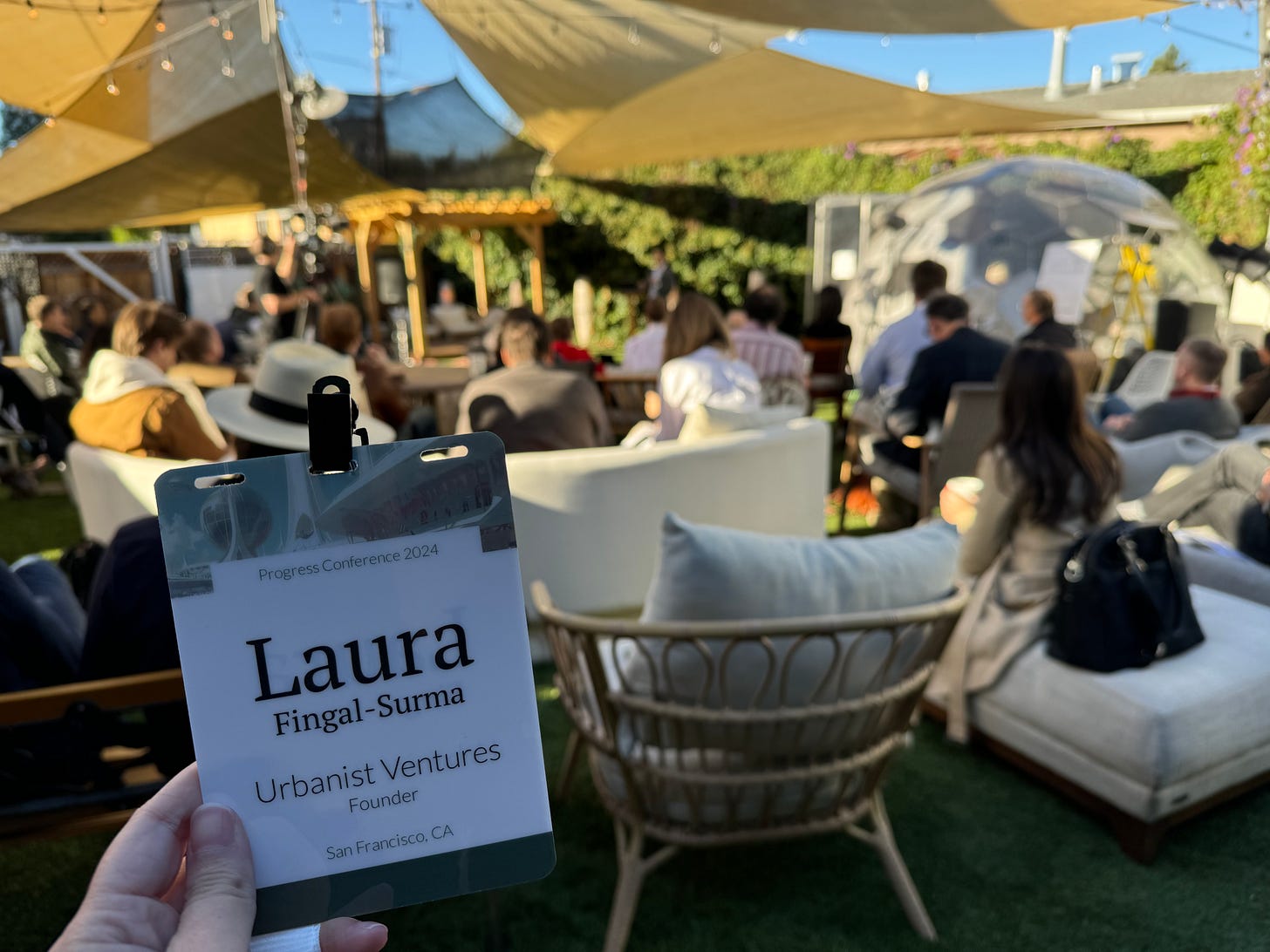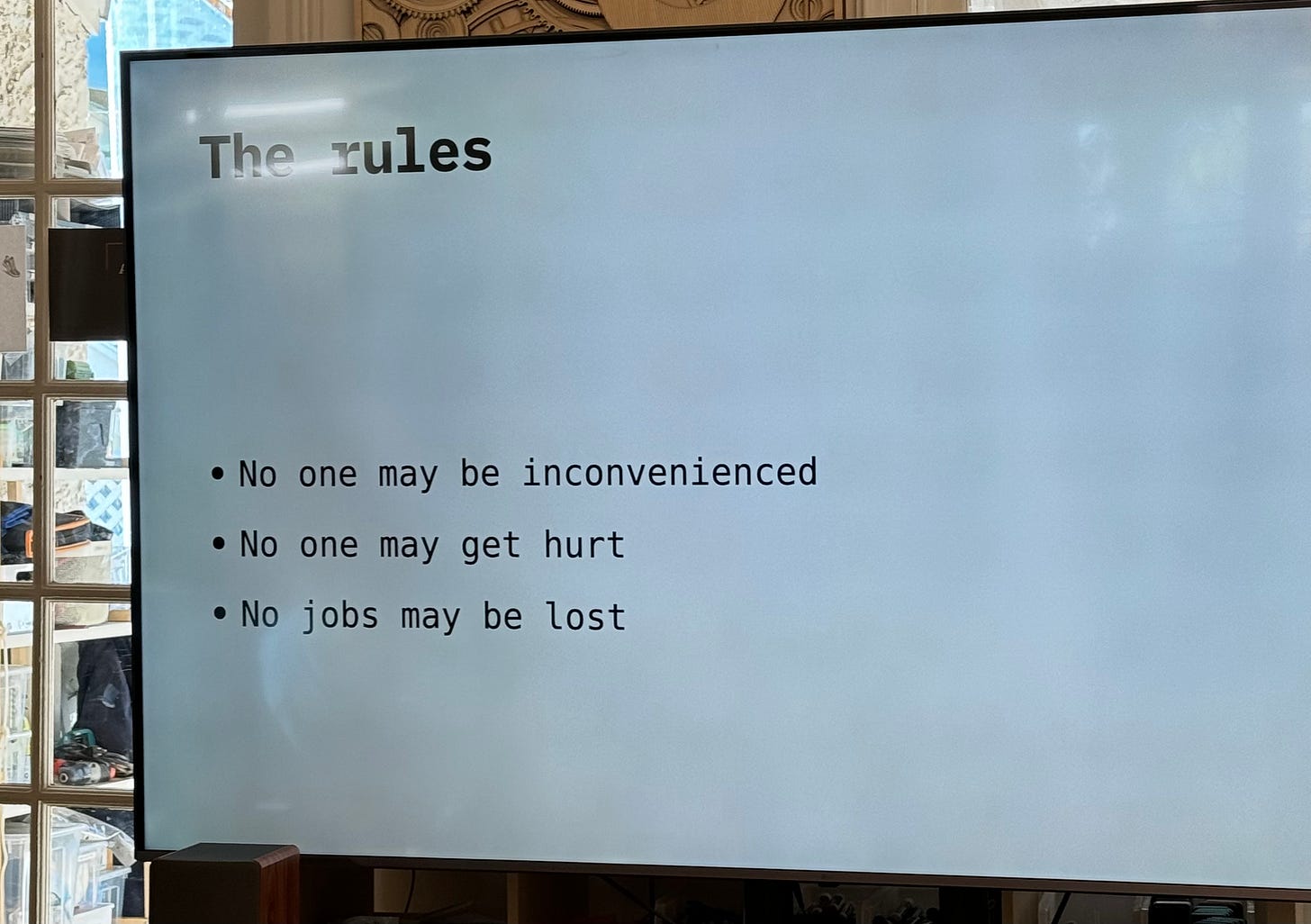Toward Abundant Futures: Notes from the inaugural Progress Conference
The moment I heard about the invite-only Progress Conference, I knew I had to be there. It did not disappoint.
As the Progress Conference approached, it occurred to me: Is this going to be the first place where talking urbanist moonshots makes me a normie? Where the wild ambition of this project to scale urbanism makes me fit in rather than stand out?
It was a novel and unfamiliar experience! Quite a vibe. I think I’ve found my people on a whole new level. A key takeaway: I crave more of this.
This was an unbelievably good event. Truly one of the best I’ve ever attended, on any subject.
— Dean W. Ball1
First, some context on the origin of progress studies and the conference, via Scott Alexander of Astral Codex Ten:
Tyler Cowen is an economics professor and blogger at Marginal Revolution. Patrick Collison is the billionaire founder of the online payments company Stripe. In 2019, they wrote an article calling for a discipline of Progress Studies, which would figure out what progress was and how to increase it. Later that year, tech entrepreneur Jason Crawford stepped up to spearhead the effort.
The immediate reaction was mostly negative. There were the usual gripes that “progress” was problematic because it could imply that some cultures/times/places/ideas were better than others. But there were also more specific objections: weren’t historians already studying progress? Wasn’t business academia already studying innovation? Are you really allowed to just invent a new field every time you think of something it would be cool to study?
It seems like you are. Five years later, Progress Studies has grown enough to hold its first conference.2
Conference host and Roots of Progress Institute founder Jason Crawford kicked us off. Jason has been serializing the first draft of The Techno-Humanist Manifesto, a book laying out a new philosophy of progress for the 21st century. I backed the project as a “founding member” and have been avidly reading every installment. It’s already my favorite book.
Techno-humanism is the view that science, technology, and industry are good—not in themselves, but because they ultimately promote human well-being and flourishing. In short, it is the view that material progress leads to human progress.3
The Techno-Humanist Manifesto captures my worldview and provides a philosophical foundation for my work with eye-watering eloquence. It’s also stretching my perspective in fascinating new ways.4 I read excerpts to my six-year-old twins that spark deep curiosity, questions, and conversation. It’s the guide and moral grounding I’ve wished for them to have as they grow up.
Jason wants shelves full of progress studies books in every bookstore, just like we presently have shelves full of books on environmental studies, gender studies, and religious studies. Based upon current momentum, I think he will succeed. I wouldn’t be surprised to see this happen within the next five years.
Beyond that, Jason believes:
We need progress as part of the curriculum in high school and undergrad
We need progress recognized and appreciated in the media
We need optimistic sci-fi and major biopics of scientists and inventors
All of this will inspire the world to build the future.
For the conference, Jason emphasized quality over quantity. He framed success as leaving the conference with one big idea or one strong connection. It was refreshing and relieved pressure on the overwhelming opportunity of the moment. Here’s some of what stuck with me and I continue to ruminate on.
Arun Rao on 10,000 Von Neumanns
The sleeper hit of the conference for me was Arun Rao previewing his new Accelerated Math and Physics Program for gifted kids.
I had met Arun at the Edge Esmeralda popup village over the summer (still need to finish writing about that life-changing experience!), initially at a workshop exploring how to make cities better for kids. When I ran into him again so soon after at the Progress Conference (and had been seeing him around online), I was intrigued. I added Arun’s unconference session to my calendar at the last minute, more out of a desire to get to know and understand him better than deep interest in the topic (sorry!).
I got caught up in conversation and missed some context in the first few minutes. I assumed my kids (again, only six years old) wouldn’t be ready for an accelerated math and physics program. Maybe I also incorrectly assumed that the program would replace traditional schooling or cost a lot of money.
After the conference, I arrived home to one of my kids talking effusively about making it to the top of a leaderboard on his iPad. He later fell sullen for an unrelated reason, and something clicked. I completely unexpectedly blurted out that I had heard about a special program at the conference that he might like! His eyes lit up. After reading more, I had both twins excited.
AMP Education today introduced the Accelerated Math and Physics Program (AMP), an on-demand educational curriculum that redefines the K-12 math, physics, and computer science education by putting a self-directed list of readings, lectures, experiments, books, and programs in the hands of any child, anywhere in the world.
The curriculum will build from the simple foundations of basic reading, counting, number operations, and geometric play to cover the foundations of a K-12 math and physics education in 6 years and a 2020 undergraduate math, physics, and computer science education in 6 years.
Just prior to the conference, we had been through the wringer with the San Francisco Unified School District clumsily naming our high-performing public elementary school for closure — after which we organized, protested, and sent the Superintendent packing in ~10 days. The closure process has halted, but one thing became abundantly clear. Despite the excellent education our children are currently receiving at their urban public school, excellence is a low priority for the district. This may become a bigger problem over time, especially now that we have ample evidence of a strong appetite for learning.
I am thrilled to have had a vetted supplemental curriculum fall right into my lap. Arun made a persuasive case that math, physics, and computer science are the most critical and timeless subjects for ambitious young people to master in the age of AI.
Scott Phoenix on Progress and Power

I can’t tell you much about what was said, but I can tell you that I liked venture capitalist Scott Phoenix of Fifty Years right away — because we were dressed almost exactly alike. Great minds. As I attempted to capture his outfit and tweet about it, I was scolded and told no photos allowed. Picture black jeans, a black t-shirt, and black athleisure shoes with white soles. No nonsense, very practical.
One snippet of what Scott said that isn’t too “unhinged” to share is that progress people care about outcomes and disregard or short-circuit process. That deeply resonated and helps explain the paths I’ve chosen. If you happen to cross paths with Scott, ask him about the convergent evolution of crabs. And Crumbl Cookies. He had me in stitches. It was a little unhinged, but in the best way.
“Progress people care about outcomes and disregard or short-circuit process.”
An audience member added insightful commentary about building power by accumulating lots of orgs and friends at “varying levels of crazy.” This further validates my strategy of building Urbanist Ventures to keep shifting the Overton window beyond where YIMBY could or would go on its own. As Addison Del Mastro recently said, “I write as myself, and I don’t have a coalition to maintain, so I can write things that other folks might agree with but are in a position that makes it difficult for them to say.”5
Eli Dourado — Why are we stagnating?
The award for most memorable slide of the conference goes to Eli Dourado, Chief Economist at the Abundance Institute, for the rules restricting innovation:
Packy McCormick already wrote extensively about his take on this session and the following one by Stanford GSB economics professor Chad Jones exploring ideas and economic growth.
What do you do with an idea?
There's a popular 2020 paper that suggests that progress slowed because ideas are getting harder to find.
But there are lots of ideas, an idea backlog even. Modern companies are being built on 50s and 60s ideas.
I think ideas got harder to turn into affordable products, which are really what drive progress.
— Packy McCormick6
Read more here:
And don’t miss this part!
As much of a New Yorker as I am, I gotta say, it feels like SF is back. People are turning ideas into products, and at the right price point, products turn into progress.
Jason Carman on The Story Engine: How the Frontier of Storytelling Could Accelerate Human Potential

I first came across Jason Carman a year ago when I took a meeting with an urbanist who was exploring ideas. You never know where such meetings are going to go or how they will turn out to be useful. He pointed to Jason as someone whose work and trajectory he admired. At the time, Jason had less than 4,000 Twitter followers. A year later, Jason has almost 29,000! His rapid rise has been nothing short of astounding.
Additionally, Jason happened to start making a name for himself at Astranis, a space unicorn founded by my spouse’s grad school roommate and good friend, John Gedmark. I never fully understood and appreciated Astranis — which builds geostationary micro satellites right here in San Francisco — until Jason started telling the company’s story on video and Twitter. (Fun fact: Earlier in his entrepreneurial journey, John tried to talk my spouse, who has been a lifer at Google, into becoming his technical cofounder, saying let’s make a billion dollars — or at least have a lot of fun trying! It sounded absolutely crazy at the time. But it turns out you can just decide to make a billion dollars — if you’re persistent and talented enough. I think there are still a lot of people, and certainly plenty of urbanists, who don’t realize how much value creation is possible.)
Jason launched Saturday Startup Stories (now referred to as S3), a weekly series of mini documentaries about people building the future, as a side project. It became wildly successful. I’ve gathered the whole family around to watch S3 episodes like I Lived With a Humanoid Robot for 48 Hours. Now, Jason is building something new on a mission to tell better stories. He calls it Nike for tech. I’ll let you wonder what that could possibly mean.
Jason insists stories are your most powerful tool. Deep tech founders tell him that they could have shaved off two whole years of effort by hyping their companies more earlier on. And by that, he means hyping their company — on Twitter — with investors in mind. Exactly what I set out to do. This further validated my Twitter-first strategy for Urbanist Ventures, rooted in what worked for YIMBY and a belief that Twitter is still where tech and politics are done.
Cool videos are insanely powerful, Jason says. “We’re trying to psyop our audience.” It’s unusual for deep tech founders to have to do the kind of storytelling that Jason requires of them so early in their startup journey. Authenticity is very important. He tries to wear his subjects out. He has them tell a story four times, then captures the time afterward when they think they are done. I have been told by more than one collaborator that I’m at my best when I am not trying too hard to get my story just right, and I’m just telling it — passionately — like it is. I like this idea of practicing, practicing, and then throwing away the script. I need to do it more.
Fawaz Al-Matrouk on Anwar: a work-in-progress sci-fi film screening
Fawaz via the Progress Studies Slack:
Jared Seehafer and I are hosting a screening of our short film Anwar, which explores themes around longevity. It’s about a mother who chooses to live forever, and a son who longs for heaven. We see him age from 8 to 18 to 80, while she remains eternal throughout, until he has a final moment of doubt, and she of hope. The film premieres in Nantes at the end of October. It stars Kerry Bishé (Halt & Catch Fire) and Jay Abdo (Herzog's Queen of the Desert).
This short film piqued my curiosity and stuck with me because my spouse became enamored with the idea of brain cryopreservation when cancer unexpectedly threatened his life. (Spoiler: He survived and our family remains intact, larger even, thanks to cutting edge modern medicine.) We grappled with topics similar to those explored in the film. What good is the eternal life that cryopreservation might provide if no one else he loved or even knew made the same choice?
The English muffin of event venues
As urbanists know, physical spaces greatly influence how we engage with each other. The Lighthaven venue was deliberately chosen to foster deep conversation and connection. Conference organizer Heike Larson told me they even declined some other options that had been offered for free.
The Lighthaven campus is the English muffin of event venues: light and airy, full of nooks and crannies where yummy b̶u̶t̶t̶e̶r̶ conversations can accrete.
— Steve Newman7
The result: I didn’t have to shout over blaring music or strain to hear, and it was an unusual treat to have the same venue late into the night. The nerd party didn’t immediately disperse when structured events were over, and we didn’t have to find somewhere else to continue the conversation.
Progress book signing
A final highlight of the event was the book signing featuring seven Progress Conference speakers. I don’t think there could possibly be a better souvenir to take home than a copy of Enlightenment Now signed by Steven Pinker for my children. Reading my badge, Tyler Cowen asked me for my outlook on YIMBY as he signed Stubborn Attachments. I briefly introduced my thesis that urbanist moonshots are needed to realize the full potential of the movement. I added that I’ve graduated from the crazy person saying YIMBY was going to be a thing to the crazy person saying urban gondolas are going to be a thing. He thought I was referring to gondolas on water. You win some, you lose some! (Yes, I clarified. But that gives you a sense of how obvious the idea is to him, apparently.)


Snippets
Steven Pinker:
Nothing is more responsible for the good old days than a bad memory.
Pandemics kill far more people than wars and genocides.
Urbanization and industrialization lowers suicide rate: People are more likely to kill themselves in small villages than big cities!
Patrick Collison is trying to convince his decabillionaire friends to un-retire and suggests a “doing pledge” rather than a giving pledge.
Chandler Tuttle, cofounder and CEO of Freethink Media:
“You can’t bring your old way of doing things to a frontier.”
News is cynical, simplistic, certain, and scared. He’s proving that the alternative works.
Alec Stapp, cofounder of the Institute for Progress, pointed out that developing countries are adopting solar faster than developed countries, and without subsidies.
Kevin Kohler recaps: Americans are from Musk, Europeans are from Greta.
Compared to other spaces I often inhabit, the Progress Conference did not feel bogged down by partisanship or local politics. And I didn’t hear a word about crypto.
Urbanist Ventures is on a mission to scale urbanism through startups. Want more access? Tell me about your interests at join.urbanist.vc. There’s something here for everyone, but if I don’t know that you are an accredited investor, I can’t share deal flow with you!
https://x.com/deanwball/status/1848008357254230169
https://x.com/jasoncrawford/status/1810356206088716465
https://x.com/urbanistvc/status/1833639803440795790
https://x.com/packym/status/1849077090534256880
https://x.com/snewmanpv/status/1848078039722463452













Finally got around to reading this, great summary and was thoroughly entertained!
I just moved to SF and would love to learn more about events like these, know of any distribution lists for people generally interested in topics surrounding progress, YIMBY, e/acc and the like? I did just sign up for ACX meetup notifications, which seems adjacent but not exactly the same
You had me at abundance. Subscribed!